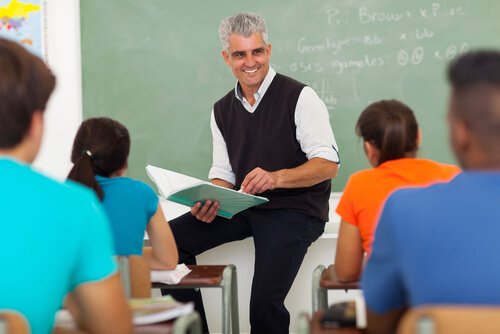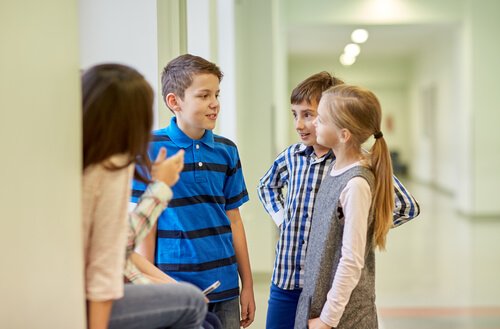The 7 Most Common Myths About Education

Some people believe that education is simple and that there is a perfect formula that leads to success. Due to these kinds of opinions, several myths about education have emerged. Misconceptions must be uncovered to break paradigms and achieve an integral education.
Everyone knows that the task of educating is not a simple one. It has its ups and downs and progress depends on the will and motivation of students.
It’s not all the teacher’s responsibility. Parents must also teach children about the necessary habits and standards for optimal behavior and performance at school.
A successful educational system is one that integrates the school, home and community. This is the only way that a consistent and stable balance can be achieved for a student.
With respect to the existing myths about education, there are many different opinions and questions that surround them.
The 7 most common myths about education
Students who come from low-income households will have poor academic performance
Each student develops according to individual means and abilities. Students have skills and abilities that they can develop at their own pace. The type of housing that a student lives in has nothing to do with learning.
In some cases, low-income students are more dedicated than higher income peers. The reason for this is that these students may be motivated to have better living conditions which can be achieved by acquiring a good profession.
Of course, family culture and having an adequate study space can influence a student’s academic performance. However, these aren’t necessarily decisive factors.
Less students in a classroom translates to better performance
The factor that really matters is the quality of teachers, not the number of students. It goes without saying that if a classroom has less students, attention will be more personalized. However, if the teacher isn’t involved, it may not matter how many students they have in the classroom.

It’s important to invest in teachers who, in addition to having a degree, have a vocation towards teaching. A teacher with a vocation will attend equally to all students whether it’s a large or small class. He or she will teach and love students with the necessary determination and zeal.
The smartest student will have the best academic performance
Although some people believe that a student’s academic performance depends on his or her intellectual inheritance rather than the effort spent studying, it’s well known that this isn’t entirely true.
All students are capable of achieving good results if enough effort and dedication is put into studying.
Innate talent can help a student in a specific field. However, this doesn’t guarantee success. Success to a large degree depends on a student’s dedication and willingness to obtain knowledge and good results in the classroom.
“School must build, in the spirit of the scholar, on the foundation of truth and on the basis of good, the column of every society: the individual.”
–Eugenio Maria de Hostos–
Students who are better with technology are smarter
In today’s world, globalization and modernization surround all of us every day. Knowing how to use technology appropriately can bring along many benefits.
However, although it’s true that the faster this type of knowledge is acquired, the better prepared a student is for the future, success when it comes to the use of technology isn’t the only indicator of a student’s intelligence.
Some students may excel in different areas such as literature, languages and science. The fact that a student doesn’t know how to use certain technology doesn’t show a lack of intelligence. Students can be intelligent in different fields.
Children who are gifted when it comes to technology are advised to use their skills as a tool to learn languages.
Physical education is not important
Physical activity brings many benefits on a neurological level. For example, exercise generates neurotransmitters such as dopamine and serotonin which help develop a student’s motivation and attention.
It can also be a useful tool for students who suffer from attention deficit and hyperactivity disorder since it keeps them active and attentive. Physical exercise strengthens both the body and mind.
Private education is a lot better than public school
All educational institutions impart the same content, the only thing that changes is the environment. The quality of education doesn’t necessarily depend on the infrastructure.
The truth is that the teacher’s vocation and the students’ drive to learn are what mark the difference. If a student wants to learn, he or she will do so in an air-conditioned room or under a tree.

High school is more difficult than primary school
This could be one of the most common myths about education. It’s repeated from generation to generation. All educational levels have their own difficulty. How these difficulties are met depends on the maturity of the student.
Primary school may be tougher for some students since they’re used to being at home with parents. The shock of leaving the home and being surrounded by other students may be traumatic at the beginning.
High school can also be difficult since at this stage students experience changes in physiology and identity. In addition, during this stage students may be asked to be more independent and they may have more homework as they advance, which can increase stress levels.
The school environment is full of misconceptions that are repeated without necessarily being true. It’s important for parents to know the real factors in order to correct possible issues.
All cited sources were thoroughly reviewed by our team to ensure their quality, reliability, currency, and validity. The bibliography of this article was considered reliable and of academic or scientific accuracy.
- Toro, J. (1981). Mitos y errores educativos. Fontanella. Barcelona. https://hemerotecate.fe.ccoo.es/assets/19831216.pdf
- Santiago, R. M. (2001). Presentación. Reformas educativas: mitos y realidades. Revista Iberoamericana de Educación, 27, 7-10. https://rieoei.org/RIE/article/view/965